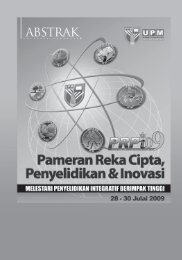BUKU ABSTRAK - Universiti Putra Malaysia
BUKU ABSTRAK - Universiti Putra Malaysia
BUKU ABSTRAK - Universiti Putra Malaysia
Create successful ePaper yourself
Turn your PDF publications into a flip-book with our unique Google optimized e-Paper software.
Aquaculture Industry Potential and Issues: A Case from Cage Culture System<br />
Entrepreneurs: Suggestions for Intensification of Aquaculture Industry<br />
Assoc. Prof. Dr. Jegak Uli<br />
Ahmad Faiz Abdul Nasir, Khairuddin Idris, Hayrol Azril Mohamed Shaffril and Jeffrey Lawrence D’Silva<br />
Institute of Social Science Studies, University <strong>Putra</strong> <strong>Malaysia</strong>,<br />
43400 UPM Serdang, Selangor, <strong>Malaysia</strong>.<br />
+603-8946 8599; hayrol82@gmail.com<br />
Keywords: Cage culture system, entrepreneurs, potentials and problems<br />
The Effects of Value Orientations and Perceived Benefits on Online Shopping<br />
Behaviour<br />
Assoc. Prof. Dr. Laily Paim<br />
Narges Delafrooz and Ali Khatibi<br />
Faculty of Human Ecology, University <strong>Putra</strong> <strong>Malaysia</strong>,<br />
43400 UPM Serdang, Selangor, <strong>Malaysia</strong>.<br />
+603-8946 7051; laily@putra.upm.edu.my<br />
Keywords: Online shopping, value orientations, perceived benefits<br />
115<br />
Social Sciences<br />
Cage culture has become a popular aquaculture system nowadays. To further intensify this economic activity<br />
the Ministry of Agriculture and Agro-based Industry (MOA) through the DOF has zoned the aquaculture industry<br />
via Aquaculture Industry Zone (ZIA) Programs throughout <strong>Malaysia</strong>. The main focus of this paper is to clarify<br />
all the potentials and problems faced by the cage culture system entrepreneurs in running their aquaculture<br />
activity. This study was a qualitative case study that provided an in-depth description of potentials and issues in<br />
aquaculture industry in the district of Kuala Pahang, <strong>Malaysia</strong>. Data was gained using a Focus Group Discussion<br />
(FGD) among the cage culture system entrepreneurs guided by an interview guide. Ten cage culture entrepreneurs<br />
were selected as the FGD members. The questions served as a guide, but allowed respondents freedom and<br />
flexibility in their answers. The cage culture system was found to provide better income that lead to a higher<br />
quality of life for the entrepreneurs, positive intangible values existed among the entrepreneurs; experiences have<br />
taught them to become self independent. There were problems identified such as no independence in selecting the<br />
fingerlings, environmental problems seem to burden them, unstable pellet price, no official agreement between<br />
them and the government emphasizing the portion of the river is given to them for running their business and lot<br />
of bureaucracies that the entrepreneurs need to face. It can be concluded that even though cage culture industry<br />
proved to enhance the level of income and quality of life, a number of problems must be overcome first to further<br />
enhance their level of income and quality of life. Therefore, there is a need for the related agencies to provide<br />
more financial supports help to solve the environmental problems and further develop their administration aspects<br />
to reduce issues such as bureaucracy and official agreement.<br />
The rising trend in internet purchasing provides a growing prospect for e-marketing in <strong>Malaysia</strong>. The Theory<br />
of Reasoned Action (TRA) and Technology Acceptance Model (TAM) provide a valid basis for explaining and<br />
predicting consumers’ online shopping behaviour. This study aims to determine (1) the effect of value orientations<br />
on consumers attitude towards online shopping, and (2) how does perceived benefits motivate consumers to shop<br />
online. A total of 370 graduate students participated in the study, and data were collected using self-administered<br />
questionnaire. The instrument for online shopping attitude demonstrated acceptable levels of internal consistency,<br />
content validity and construct validity (factor analysis). Cronbach’s alpha coefficients were high in all scales,<br />
ranging from 0.83 to 0.90. The multiple regression analysis revealed that utilitarian value orientation had high<br />
effect (? = .115, p= .000) on attitude, while hedonic orientation had no significant effect (? = .037, p= .076) on<br />
attitude toward online shopping. The findings of the study implied that convenience (time and money saving) (?<br />
= .437, p= .000), cheaper prices (? = .206, p= .000) and wider selection (? = .243, p= .000) were dominant factors<br />
that motivate consumers to shop online. Success in creating highly favorable attitude toward online shopping by<br />
enhancing the perceived benefit, will consequently move forward the online marketing rigorously.



